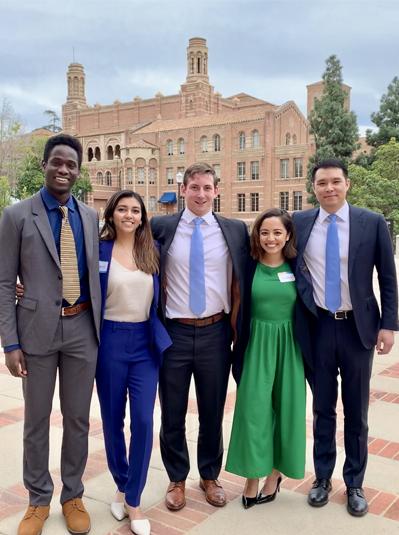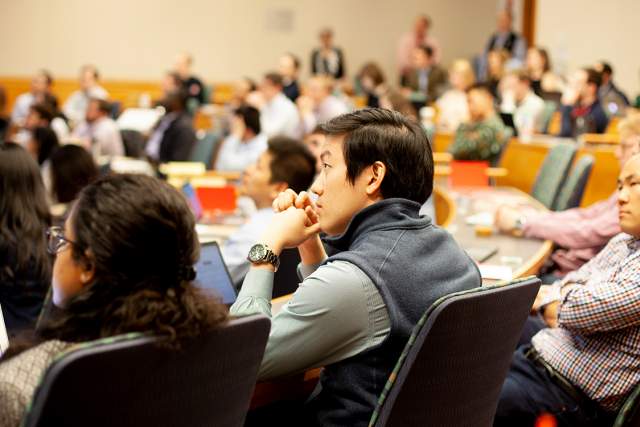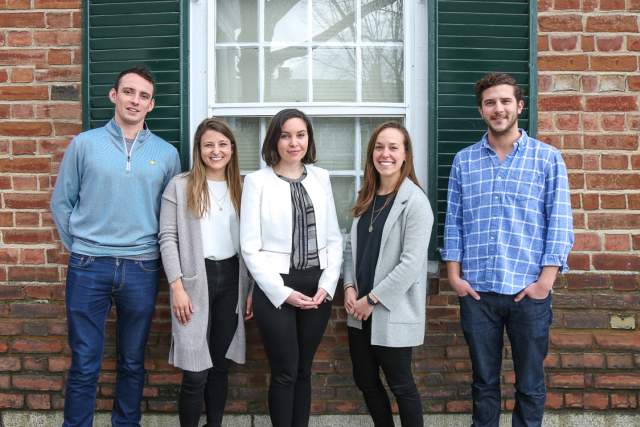When Keri Arslancan T’21 saw the lineup of competitors at the Media and Entertainment Case Competition, she knew it would be an interesting day of presentations before executives from Paramount Pictures.
MBA programs with well-known media specialties—such as UCLA Anderson, USC Marshall, Columbia, and NYU Stern—each sent two teams. Harvard Business School also sent two teams. Nevertheless, the team from Tuck emerged victorious, relying on their experience in the media industry and their shared passion for the topic.
The Tuck team, composed of T’21s Keri Arslancan, Krishna Desai, Andrew Ho, Kwabena Nimo, and Kyle Trehub, took home a check for $4000 and an offer for a summer internship at Paramount Studios.
The competition took place on February 27, at the UCLA Anderson School of Management. A week before that, each team was given a two-part prompt to answer through a PowerPoint presentation and a Q&A session on the day of the competition. The teams were asked where they believe the entertainment industry is heading in the next five years, and what Paramount should do now to prepare for it. They were given three options to choose from: 5G connectivity, interactive entertainment, or theatrical innovation.
The team from Tuck put their bet on interactive entertainment. They based their choice on the surging popularity of video games, which earn more annual revenue than traditional home entertainment, and have done so by a larger margin for each of the past three years. “We felt that audiences wanted some level of personalization and interactivity, which is something video games offer,” says Arslancan, who spent eight years at the Fox Networks Group (recently acquired by The Walt Disney Company) in Turkey. “It’s also something we’re seeing online.”
Just being able to work really hard on a team with new people—the Tuck study group culture helped us push hard toward a goal.
Each team had 10 minutes to argue their case, followed by a 10-minute question-and-answer session with the judges, who are executives at Paramount (up to the CFO level, and across functions from HR to casting). After the Tuck team made it through the first round, the difficulty of the questions increased considerably. Arslancan noticed that some teams were relying on one team member to answer questions, and she thinks the Tuck team differentiated itself by having all of its members offer different points and perspectives. “If Kyle gave an answer, I offered some of the background I knew,” Arslancan says, “or if Krishna had an answer, KB threw in a different perspective.”

The Tuck team, from left to right: T’21s Kwabena Nimo, Krishna Desai, Kyle Trehub, Keri Arslancan, and Andrew Ho.
That sort of collaboration was facilitated, Arslancan believes, by the unique Tuck core curriculum and its emphasis on teamwork. Before this competition, the five Tuck team members had never worked with each other, but they gelled quickly.
“Just being able to work really hard on a team with new people—the Tuck study group culture helped us push hard toward a goal,” Arslancan says.
In the end, the judges’ decision was nearly unanimous—something that hasn’t happened before in the competition’s seven-year history.
“The win itself was a surprise, since there were a few teams that we were all impressed by,” recounts Krishna Desai. “When we heard the preamble to the announcement, we looked around, laughed, and said ‘at least it was a fun trip to LA!’ But when they called our names, we all kind of looked at each other, super surprised, and made our way to the stage.”

